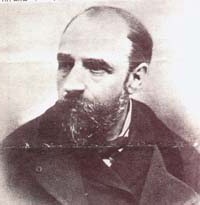Valentin Magnan
Jacques Joseph Valentin Magnan (born March 16, 1835 in Perpignan , † September 27, 1916 in Paris ) was a French doctor and psychiatrist . He is considered one of the most important theorists of the fin de siècle theory of degeneration .
Life
Magnan studied medicine in Montpellier and Lyon . In 1858 he became an assistant doctor at the Lyon Hospital, but soon moved on to Paris , where he worked at the Hospiz de l'Antiquaille. It was here that his interest in psychiatry was aroused. After receiving his doctorate on December 29, 1863, he first became assistant to Victor Marcé and Prosper Lucas at the Bicêtre hospital in Paris . In 1865 he moved to the Salpêtrière hospital , where he worked with Jean-Pierre Falret . Baron Georges-Eugène Haussmann noticed him when Magnan was successfully treating Crown Prince Napoléon Eugène Louis Bonaparte at the Paris Hôspital de L'enfant Jésus in 1867 . Haussmann handed over the management of the reception ward to Magnan in the new Sainte-Anne insane asylum in Paris.
Magnan worked until his retirement on July 30, 1912 "as the gray eminence of French psychiatry" in Sainte-Anne, where he also taught clinical psychiatry and thus founded his school. He experienced it as a personal humiliation that in 1875 it was not he, as an experienced institutional psychiatrist, but the neurologist Benjamin Ball (1833-1893) who was appointed to the new chair for psychiatry established in 1877 at the Paris Medical Faculty. Contemporaries described Magnan, who was paralyzed after an accident in childhood, as an unfriendly, self-righteous man. He made many enemies among his specialist colleagues and gradually lost influence over the years. After Ball's death in 1893, Magnan reapplied for the chair to no avail. He was an officer of the Legion of Honor and commander of the “Ordre royal de la Convention du Portugal”.
plant
Magnan first made a name for himself with studies on progressive paralysis . In 1865 he received the “Prix Civrieux” from the Académie nationale de Médecine for a thesis on the connection between paralysis and madness . In 1866 he completed his habilitation on the anatomy of paralysis. His first publication, however, dealt with the effects of absinthe poisons in 1864 . With his experiments on the effects of absinthe and alcohol consumption on the psyche, Magnan provided the scientific tools for the campaign in the 1870s that led to the ban on absinthe in 1915. His theories were processed by Émile Zola in his novel The Blackjack .
Magnan became particularly well known and controversial for his work on the classification of mental illnesses . He developed Bénédict Augustin Morel's theory of degeneration further, stripping it of its religious foundation. He divided mental illnesses into the periodically occurring, basically curable degenerative insanity ( dégénérescence mental ) and the progressive , incurable délire chronique . The medical historian Edward Shorter has therefore accused Magnan of spreading the doctrine of degeneration and blocking the acceptance of schizophrenia in France, thereby isolating French psychiatry internationally. Magnan's interpretation of the theory of degeneration was, however, critically discussed in French psychiatry, for example at some meetings of the Société médico-psychologique in the years 1885 to 1888. Magnan did not go far enough for followers of Morel's theory of degeneration ; Too far for critics of the theory of degeneration. In the course of the French reception of the nosology of the German psychiatrist Emil Kraepelin , Magnan's system was then seen as wrong and outdated. In Germany, Magnan's theses were mainly disseminated through translations of Paul Julius Möbius '.
Fonts
- Etude expérimentale et clinique sur l'alcoolisme. alcool et absinthe, épilepsie absinthique . Paris 1871.
- De l'Alcoolisme, the diverse formes du délire alcoolique et de leur traitement . Paris 1874.
- Recherches sur les centers nerveux: Alcoholisme, folie des heréditaires dégénérés, paralysei générale, Médicine legale. Paris 1876-1893.
- Leçons cliniques sur la Dèpromanie faites a l'asile de Sainte-Anne. , Paris 1884.
- Des anomalies, des aberrations et des perversions sexuales, par Magnan… (Communication faite à l'Académie de médecine dans la séance du 13 janvier 1885.) . Paris 1885.
- with Paul J. Möbius: Psychiatric lectures. Thieme, Leipzig 1891-.
- with Paul J. Möbius: About the "Délire chronique à évolution systématique" (Paranoia chronica with systematic development or Paranoia completa). Thieme, Leipzig 1891.
- with Paul J. Möbius: About the mental disorders of the degenerate. Thieme, Leipzig 1892.
- with Paul J. Möbius: About the mental disorders of the degenerate (continuation), about intermittent insanity and the like. A. Thieme, Leipzig 1893.
- with Paul J. Möbius: About mania, about alcoholism, about simulation and misunderstanding of insanity. Thieme, Leipzig 1893.
literature
- René Semelaigne: Les pionniers de la psychiatrie française . Vol. 2, Paris 1932, pp. 63ff.
- Ian Dowbiggin: Back to the Future: Valentin Magnan, French Psychiatry, and the Classification of Mental Diseases, 1885-1925. In: Social History of Medicine . 9 (1996), pp. 383-408, PMID 11618728 , doi: 10.1093 / shm / 9.3.383
- MJ Eadie: Absinthe, Epileptic Seizures and Valentin Magnan. In: Journal of the Royal College of Physicians of Edinburgh . 39 (2009), pp. 73-78, PMID 19831287 .
Web links
- Literature by and about Valentin Magnan in the SUDOC catalog (Association of French University Libraries)
Individual evidence
- ^ A b Edward Shorter: A History of Psychiatry. From the Era of the Asylum to the Age of Prozac. NY 1997, pp. 86f.
| personal data | |
|---|---|
| SURNAME | Magnan, Valentin |
| ALTERNATIVE NAMES | Magnan, Jacques Joseph Valentin (full name) |
| BRIEF DESCRIPTION | French psychiatrist |
| DATE OF BIRTH | March 16, 1835 |
| PLACE OF BIRTH | Perpignan |
| DATE OF DEATH | September 27, 1916 |
| Place of death | Paris |
